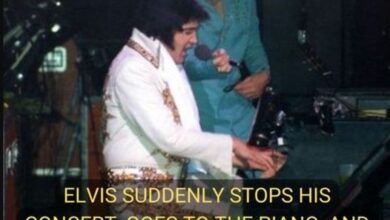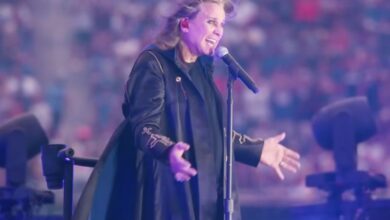The pain echoed in his voice; two months after, he left, a lion to the end, though weakened.
Johnny Cash’s final live performance, held on July 5, 2003, at the Carter Family Fold in Hiltons, Virginia, remains a powerful tribute to his extraordinary legacy as one of the most revered figures in American music history. At this late stage in his life, Cash was contending with significant health issues, including severe vision impairment and physical frailty, which were compounded by the recent death of his beloved wife, June Carter Cash. Despite these challenges, his performance was marked by a resilience and dedication that deeply moved those in attendance.
The Carter Family Fold, a historic venue founded by June Carter Cash’s family, holds a special place in Johnny Cash’s heart. Known for its intimate setting and rich musical heritage, the Fold provided a perfect backdrop for Cash’s farewell performance. The venue, nestled in the Appalachian Mountains, is renowned for hosting performances that honor traditional country and folk music, aligning seamlessly with Cash’s own musical roots and influences. This setting allowed Cash to connect deeply with the audience, many of whom were long-time fans and fellow musicians who had been part of his journey.
The concert opened with Cash’s familiar, unassuming greeting, “Hello, I’m Johnny Cash,” setting a tone of intimate familiarity that characterized the evening. He was accompanied by a small ensemble featuring his son, John Carter Cash, on vocals, along with Jerry Hensley on guitar and Bobby Starnes on bass. The simplicity of the arrangement highlighted Cash’s raw vocal talent and the emotional weight of his performance. The setlist was a poignant collection of Cash’s most beloved songs, including classics like “Folsom Prison Blues,” “I Walk the Line,” “Ring of Fire,” and “Big River.” Kris Kristofferson’s reflective “Sunday Mornin’ Comin’ Down” was also featured, showcasing Cash’s ability to interpret other artists’ work with his signature depth.
A particularly emotional moment came when Cash performed “Angel Band,” a song previously sung by Emmylou Harris at June Carter Cash’s funeral. This performance was a deeply personal tribute to his late wife, highlighting the profound grief Cash was enduring while honoring the significant role she had played in his life. The song’s reverent tone and heartfelt delivery resonated deeply with the audience, many of whom were moved by the visible display of Cash’s enduring love and loss. Another notable moment was Cash’s rendition of “Understand Your Man,” a song he had not performed in over twenty years. Its inclusion added a layer of nostalgia to the evening, reflecting on his enduring journey as an artist and the passage of time.
Throughout the concert, Cash’s voice, though affected by age and illness, maintained a remarkable emotional resonance that captured the audience’s attention. His gravelly tones carried the weight of years of experience, pain, and triumph, adding depth to each performance. He spoke candidly about the influence of June’s spirit on his life and work, creating a touching link between his personal experiences and his musical expression. This ability to merge personal emotion with performance was a defining feature of Cash’s career and was poignantly evident during this final show. His storytelling between songs provided insight into his thoughts and feelings, offering a glimpse into the man behind the legend.
Johnny Cash’s influence on American music extended far beyond his distinctive vocal style and rebellious spirit. His contributions bridged various genres, including country, rock, and folk, reflecting his diverse musical influences and his capacity to resonate with a wide audience. As one of the most iconic and enduring figures in the music industry, Cash’s final performance at the Carter Family Fold stands as a testament to his profound impact on the world of music and his unwavering dedication to his craft. His ability to connect with listeners on a personal level made his music timeless, continuing to inspire new generations of artists and fans alike.
The atmosphere at the Carter Family Fold that night was one of reverence and celebration. Attendees included fellow musicians, family members, and dedicated fans who had followed Cash’s career for decades. The intimate setting allowed for a personal connection between Cash and the audience, fostering a sense of community and shared history. The lighting was soft, casting a warm glow that complemented the acoustic nature of the performance. The simplicity of the setup—primarily Cash and his small ensemble—ensured that the focus remained on the music and the emotions it conveyed.
As the evening progressed, the setlist traversed the breadth of Cash’s career, highlighting his versatility as an artist. Songs like “Hurt,” originally by Nine Inch Nails, showcased his ability to reinterpret contemporary music with his own unique perspective, adding layers of meaning and emotion. His performance of “Hurt” was particularly poignant, reflecting on themes of pain, redemption, and mortality. This rendition, filled with raw honesty, served as a fitting closing chapter to his storied career, leaving a lasting impression on those present.
The final moments of the concert were marked by a collective sense of closure and gratitude. Cash expressed his thanks to the audience, acknowledging their unwavering support throughout his career. The applause was heartfelt, echoing the deep respect and admiration felt by all in attendance. As he played his final notes, there was a palpable sense of finality, yet also a celebration of a life rich with music and legacy. The simplicity of his departure—leaving the stage quietly—underscored the humility that had always been a hallmark of his persona.
In the years following his final performance, Johnny Cash’s legacy has only grown stronger. His music continues to be celebrated for its honesty, emotional depth, and cultural significance. Posthumous releases and tributes have kept his memory alive, introducing his work to new audiences and ensuring that his influence endures. Artists across various genres cite Cash as an inspiration, drawn to his ability to blend storytelling with powerful musicality. His songs remain staples in the repertoires of country and folk musicians, and his life story serves as a beacon of resilience and authenticity.
Reflecting on Cash’s final performance offers a profound appreciation for his contributions to music and culture. It serves as a reminder of the power of music to heal, connect, and inspire. Johnny Cash’s ability to convey deep emotion and tell compelling stories through his songs created a lasting impact that transcends generations. His final concert at the Carter Family Fold encapsulated the essence of his artistry—simple yet profound, personal yet universal. It stands as a fitting farewell to a man whose music touched countless lives and whose legacy continues to resonate.
In conclusion, Johnny Cash’s last performance was more than just a concert; it was a heartfelt farewell from a beloved artist to his fans and loved ones. Despite facing significant personal and health challenges, Cash delivered a performance that was both moving and memorable, showcasing his enduring talent and unwavering spirit. The Carter Family Fold provided the perfect setting for this poignant event, allowing Cash to leave the stage with dignity and grace. His final notes echoed the themes of love, loss, and redemption that had defined his career, leaving an indelible mark on all who witnessed it. Johnny Cash’s legacy lives on through his timeless music and the profound impact he had on the world of American music.



